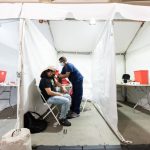Americans’ lung health: The poor suffer most
The health of your lungs may have a lot to do with the size of your bank account, a new, large study indicates.
The health of your lungs may have a lot to do with the size of your bank account, a new, large study indicates.
A new study analyzing the association between an individual’s genetics (genotype) and their observable characteristics resulting from the interaction of genetics and the environment (phenotype), contributes...
For patients who have experienced certain common types of stroke, a small chip inserted under the skin may help physicians predict their likelihood of experiencing a...
Researchers have discovered a gene, OTUD7A, that impacts the development of Ewing sarcoma, a bone cancer that occurs mainly in children. They have also identified a...
The Treatabolome project is a research initiative to develop a freely available, interoperable online platform dedicated to disseminating rare disease and gene-specific treatment information to healthcare...
A new miniature 3D model of human bone marrow has been described today in the open-access eLife journal.
Non-alcoholic fatty liver disease (NAFLD) is the most common cause of chronic liver disease worldwide. NAFLD patients are at higher risk of developing non-alcoholic steatohepatitis (NASH),...
Scientists have revealed a potential mechanism for how traumatic brain injury leads to neurodegenerative diseases, according to a study in fruit flies, and rat and human...
Among people who have strokes and COVID-19, there is a higher incidence of severe stroke as well as stroke in younger people, according to new data...
Over 50% of adults surveyed across six different countries report experiencing weight stigma, and those who engage in self-stigma and self-blame for their weight are more...








